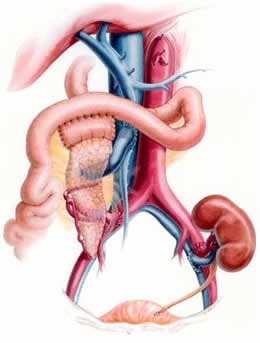Kidney Pancreas Transplant
Kidney Pancreas Transplant
What is a simultaneous kidney-pancreas transplant (SKP)?
A kidney-pancreas transplant is an operation to place both a kidney and a pancreas — at the same time — into someone who has kidney failure related to type 1 diabetes. In many cases, both transplanted organs may come from one deceased donor. However, it is also possible for the kidney to come from a living donor (a family member or friend) and the pancreas from a deceased donor.
The first successful kidney-pancreas transplant in the United States took place in 1966. Since then, many of these operations take place each year. In 2015, about 700 were done at transplant centers in the United States.
Is it possible to have kidney and pancreas transplants at different times?
Yes. Sometimes, a patient who has kidney failure because of type 1 diabetes may have a kidney transplant first, followed by a pancreas transplant at a later date.
 Who is a candidate for kidney-pancreas transplant?
Who is a candidate for kidney-pancreas transplant?Adults who have kidney failure because of type 1 diabetes are possible candidates for a kidney-pancreas transplant. In type 1 diabetes, the pancreas does not make enough insulin, a hormone that controls the blood sugar level in your body. The transplanted pancreas can make insulin and correct this type of diabetes.
In order to become active on the transplant waiting list you must be:
* 18 years or older.
* Have both Type 1 diabetes and kidney failure.
* Complete evaluation and be approved by transplant center for a kidney and pancreas transplant.
How long is the wait?
The waiting time for a kidney-pancreas transplant varies from person to person and can be affected by your blood type and how long it takes for a suitable deceased donor to become available.
The average wait for a simultaneous kidney and pancreas is about 3 years. As of September 2013, there are more than 2,000 candidates listed on the national waiting list awaiting a kidney-pancreas transplant.
In 2014, the United Network for Organ Sharing (UNOS) made changes to policies on how organs are allocated.
How successful are kidney-pancreas transplants?
The national average for survival rates of kidney-pancreas transplants in adults is 95% still functioning well one year after the operation, and 92.5% at three years.
For living donors, the best results are usually seen with a closely matched kidney from a living donor (usually from a sibling). The next best results are seen with a kidney from a less closely matched living donor (such as a spouse or friend).
The success rates are also good for combined kidney-pancreas transplants from deceased donors. The best results are usually seen when both the pancreas and a kidney come from the same donor: a deceased donor. This is because the risk of rejection is greatly reduced. However, there have been many transplants performed using a living donor, with one kidney and a pancreas segment being donated.
Who pays for the transplant?
Medicare pays for many of the kidney-pancreas transplant costs. If you have private insurance, you should check with your insurance agent about coverage for this transplant. This may help to pay for some of the costs. The social worker or a financial counselor at your transplant center may be able to help you find local, state or national programs that can help with the costs of the transplant and post-operation treatment, including needed medicines.
What should I expect after the operation?
The care after a kidney/pancreas transplant is very similar to a kidney transplant alone. One difference is that after a kidney/pancreas transplant you may spend a day or so in the intensive care unit (ICU) for close watching to make sure both kidney and pancreas are working well. If there are no problems such as rejection or infection, you should be able to go home in seven to ten days.
Remember that you will need to take special medicines, called immunosuppressive or anti-rejection medications, following your transplant operation to help prevent your body from rejecting your newly transplanted organs. You need to take these medicines exactly as the doctor prescribes for the rest of your life.
